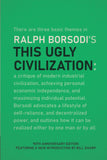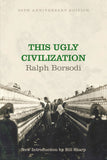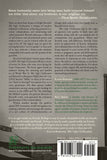This Ugly Civilization | 90th Anno. Edition | Ralph Borsodi
There are three basic themes in Ralph Borsodi’s This Ugly Civilization: a critique of modern industrial civilization, achieving personal economic independence, and maximizing individual potential. Borsodi advocates a lifestyle of self-reliance and decentralized power, and outlines how it can be realized either by one man or by all. The logical steps are given for moving beyond a “victory garden” so that each of us may cultivate a human-scale existence compatible with nature and the pursuit of the good life.
Received with great interest upon release in 1929, This Ugly Civilization offered a course of action for those who were soon facing the Great Depression. The book again found an audience during the rationing and instability of World War II. This Ugly Civilization and Borsodi’s subsequent Flight from the City (1933) became “bibles” to many in the successive “back-to-the-land” movements that occur every generation. His ideas gained further momentum among young people looking for answers in the 1960s and 70s. The indefatigable Mildred Loomis, the greatest advocate of Borsodi’s work, even garnered the nickname “grandmother of the counterculture.”
Within another decade, the punk-inspired DIY movement would rail against centralizing authority and encourage the creation of a new culture of self-determination—although such radical ideas were hardly new, as Borsodi’s book shows.
This Ugly Civilization rejects the reign of quantity over quality in both man and machine, along with the concomitant rise of consumerism and groupthink. Above and beyond mere self-sufficiency, Barsodi champions an appreciation of beauty, uniqueness and craftsmanship over the factory conformity being imposed in every sector of life. He has written a pragmatic, poetic and philosophical work that will speak to every thoughtful nonconformist. It represents an early seed of the Green Revolution that continues to promote health, comfort and independence. It is about living a whole, organic life and developing the potential of the individual, the family and the surrounding community.
Ralph Borsodi (1888–1977) was a decentralist, agrarian and homesteader, among other interests. He was the author of more than a dozen books and helped to establish a number of intentional communities.
Bill Sharp is founder and director of Transition Centre (www.transitioncentre.org). In addition to having been a trustee and historian for the School of Living, Sharp has managerd a number of projects related to community, economic and human development.
Ralph Borsodi (1888–1977) was a decentralist, agrarian and homesteader, among other interests. He was the author of more than a dozen books and helped to establish a number of intentional communities.
Bill Sharp is founder and director of Transition Centre (www.transitioncentre.org). In addition to having been a trustee and historian for the School of Living, Sharp has managerd a number of projects related to community, economic and human development.
We Also Recommend
Customer Reviews
Based on 1 review
Write a review











